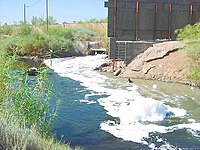
Simple high-performance liquid chromatography-ultraviolet method for simultaneous separation and detection of 14 bisphenol pollutants in building materials.
Sign Up to like & getrecommendations! Published in 2023 at "Journal of separation science"
DOI: 10.1002/jssc.202300006
Abstract: A HPLC-UV method was developed for rapidly and simultaneously analyzing novel and typical bisphenols in building materials, including bisphenol S, diphenolic acid, bisphenol F, bisphenol E, bisphenol A, bisphenol B, bisphenol AF, bisphenol AP, bisphenol… read more here.
Keywords: bisphenol bisphenol; detection; bisphenol; method ... See more keywords

Multi-analytical methodology to diagnose the environmental impact suffered by building materials in coastal areas
Sign Up to like & getrecommendations! Published in 2017 at "Environmental Science and Pollution Research"
DOI: 10.1007/s11356-017-0798-0
Abstract: This work is focused on the development of an innovative multi-analytical methodology to estimate the impact suffered by building materials in coastal environments. With the aim of improving the in situ spectroscopic assessment, which is… read more here.
Keywords: methodology; multi analytical; impact suffered; building materials ... See more keywords

Biocide emissions from building materials during wet weather: identification of substances, mechanism of release and transfer to the aquatic environment
Sign Up to like & getrecommendations! Published in 2019 at "Environmental Science and Pollution Research"
DOI: 10.1007/s11356-019-06608-7
Abstract: Biocides are added to or applied on building materials to prevent microorganisms from growing on their surface or to treat them. They are leached into building runoff and contribute to diffuse contamination of receiving waters.… read more here.
Keywords: building materials; aquatic environment; receiving waters; biocide emissions ... See more keywords

Natural radioactivity in building materials, indoor radon measurements, and assessment of the associated risk indicators in some localities of the Centre Region, Cameroon
Sign Up to like & getrecommendations! Published in 2022 at "Environmental Science and Pollution Research"
DOI: 10.1007/s11356-022-19781-z
Abstract: The objective of the current study is to investigate the natural radioactivity of some building materials, the resulting long-term external and internal effective dose equivalents (EEDE and IEDE) analysis followed by indoor radon measurements, and… read more here.
Keywords: building materials; risk indicators; radon measurements; indoor radon ... See more keywords

Measurement of radon exhalation rate in various building materials and soil samples
Sign Up to like & getrecommendations! Published in 2017 at "Journal of Earth System Science"
DOI: 10.1007/s12040-017-0797-z
Abstract: Indoor radon is considered as one of the potential dangerous radioactive elements. Common building materials and soil are the major source of this radon gas in the indoor environment. In the present study, the measurement… read more here.
Keywords: radon exhalation; building materials; exhalation rate; exhalation ... See more keywords

Comparison of nest-building materials in farrowing crates
Sign Up to like & getrecommendations! Published in 2018 at "Applied Animal Behaviour Science"
DOI: 10.1016/j.applanim.2018.02.008
Abstract: Abstract The farrowing crate restricts the performance of natural behaviour of sows, such as nest building, by limiting both sow movement and use of suitable nest-building materials. Restriction leads to short- and long lasting changes… read more here.
Keywords: nest building; comparison nest; building materials; materials farrowing ... See more keywords

Alternately airtight/ventilated emission method: A universal experimental method for determining the VOC emission characteristic parameters of building materials
Sign Up to like & getrecommendations! Published in 2018 at "Building and Environment"
DOI: 10.1016/j.buildenv.2017.12.025
Abstract: Abstract The volatile organic compound (VOC) emissions of building materials are characterized by three key parameters: the initial emittable concentration (C0), the partition coefficient (K), and the diffusion coefficient (D). Accurate determination of these three… read more here.
Keywords: voc emission; method; airtight ventilated; building materials ... See more keywords

Modelling and testing of VOC source suppression effect of building materials modified with adsorbents
Sign Up to like & getrecommendations! Published in 2019 at "Building and Environment"
DOI: 10.1016/j.buildenv.2019.03.003
Abstract: Abstract Volatile organic compounds (VOCs) emitted from decorative building materials are the main source of indoor air pollution, which endangers human health. Source control is the most direct method to reduce the amount of harmful… read more here.
Keywords: suppression effect; modified building; building; building materials ... See more keywords

Hygric properties of porous building materials (VI): A round robin campaign
Sign Up to like & getrecommendations! Published in 2020 at "Building and Environment"
DOI: 10.1016/j.buildenv.2020.107242
Abstract: Abstract Hygric properties of porous building materials are important for hygrothermal analysis. Their experimental determination is however not always reliable, shown by the discrepant results from different laboratories on the same materials. In this study,… read more here.
Keywords: hygric properties; properties porous; robin campaign; porous building ... See more keywords

Networking human biomarker and hazardous chemical elements from building materials: Systematic literature review and in vivo test
Sign Up to like & getrecommendations! Published in 2021 at "Building and Environment"
DOI: 10.1016/j.buildenv.2021.107603
Abstract: Abstract Healthy and comfortable indoor environment has attracted attentions by researchers as people spend majority of time inside enclosed spaces. Details regarding hazardous chemicals emanated from those are not systemically investigated and managed despite the… read more here.
Keywords: biomarker; chemical elements; impact; vivo test ... See more keywords

Development and modeling of the effective bioactive poultices for reducing the nitrate content in building materials
Sign Up to like & getrecommendations! Published in 2017 at "Construction and Building Materials"
DOI: 10.1016/j.conbuildmat.2017.03.075
Abstract: Abstract Two types of poultices, selected after the investigation of a number of raw materials, whose combination showed desired activities, were combined with a Pseudomonas stutzeri suspension to yield effective bioactive poultices for reducing the… read more here.
Keywords: effective bioactive; poultices reducing; bioactive poultices; building materials ... See more keywords